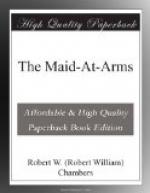Suddenly from the bastion on the west angle of the fort a shaft of flame leaped; a majestic cloud buried the parapet, and the deep cannon-thunder shook the evening air. Above the writhing smoke, now stained pink in the sunset light, a flag crept jerkily up the halyards of a tall flag-staff, higher, higher, until it caught the evening wind aloft and floated lazily out.
“It’s the new flag,” whispered Elerson, in an awed voice.
We stared at it, fascinated. Never before had the world seen that flag displayed. Blood-red and silver-white the stripes rippled; the stars on the blue field glimmered peacefully. There it floated, serene above the drifting cannon—smoke, the first American flag ever hoisted on earth. A freshening wind caught it, blowing strong out of the flaming west; the cannon-smoke eddied, settled, and curled, floating across its folds. Far away we heard a faint sound from the bastions. They were cheering.
Cap in hand I stood, eyes never leaving the flag; Mount uncovered, Elerson and Murphy drew their deer-skin caps from their heads in silence.
After a little while we caught the glimmer of steel along the forest’s edge; a patch of scarlet glowed in the fading rays of sunset. Then, out into the open walked a red-coated officer bearing a white flag and attended by a drummer in green and scarlet.
Far across the clearing we heard drums beating the parley; and we knew the British were at the gates of Stanwix, and that St. Leger had summoned the garrison to surrender.
We waited; the white flag entered the stockade gate, only to reappear again, quickly, as though the fort’s answer to the summons had been brief and final. Scarcely had the ensign reached the forest than bang! bang! bang! bang! echoed the muskets, and the rifles spat flame into the deepening dusk and the dark woods rang with the war-yell of half a thousand Indians stripped for the last battles that the Long House should ever fight.
About ten o’clock that night we met a regiment of militia on the Johnstown road, marching noisily north towards Whitestown, and learned that General Herkimer’s brigade was concentrating at an Oneida hamlet called Oriska, only eight miles by the river highway from Stanwix, and a little to the east of Oriskany creek. An officer named Van Slyck also informed me that an Oneida interpreter had just come in, reporting St. Leger’s arrival before Stanwix, and warning Herkimer that an ambuscade had been prepared for him should he advance to raise the siege of the beleaguered fort.
Learning that we also had seen the enemy at Stanwix, this officer begged us to accompany him to Oriska, where our information might prove valuable to General Herkimer. So I and my three riflemen fell in as the troops tramped past; and I, for one, was astonished to hear their drums beating so loudly in the enemy’s country, and to observe the careless indiscipline in the ranks, where men talked loudly and their reckless laughter often sounded above the steady rolling of the drums.




